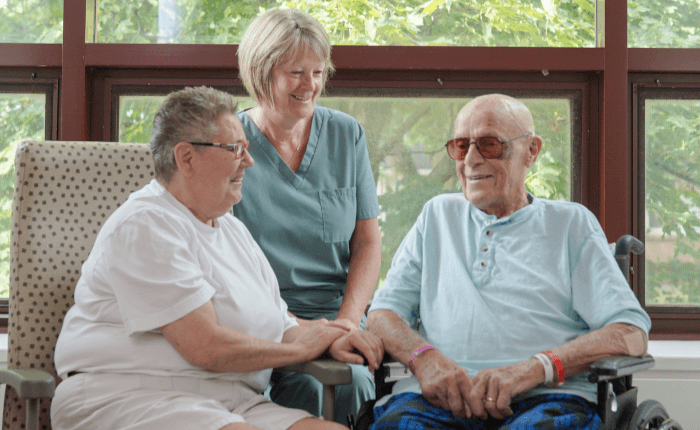Speech and Language Pathology

What is Speech and Language Pathology?
Speech and Language Pathology (SLP) specializes in the evaluation, treatment and prevention of speech, communication and cognitive communication disorders, voice disorders and swallowing disorders. Speech-language pathologists (S-LPs) are involved with the prevention, identification, assessment, treatment and (re)habilitation of communication and/or swallowing disorders in children and adults.
S-LP’s work in a variety of treatment settings. Within the hospital setting, the S-LP will:
- Conduct appropriate screens, assessments, group and individual therapy sessions
- Assess and treat various areas such as: articulation, language, cognition, fluency, voice, dysphagia and motor speech
- Supervise support personal (i.e., Communication Disorders Assistants or CDA) and students (SLP and CDA students)
- Work in conjunction with the allied health team to meet patient centered goals
- Complete Modified Barium Swallow (MBS) studies in conjunction with the Radiology department
- Engage in and provide continuous learning for students and colleagues
What are some of the treatment techniques an S-LP uses?
S-LP’s use a number of treatment techniques. Some examples are:
- Swallowing and oral motor exercises to improve swallowing and the movement of the tongue, lips and jaw
- Making eating and drinking safer by:
- Adjusting the texture of food and/or drinks
- Recommending and practicing postural adjustments during meals
- Using adaptable items when eating and/or drinking (i.e. controlled lip cups)
- Trialing voice amplifiers or hearing devices (e.g. Pocket Talkers)
- Modified Barium Swallow (MBS) studies which is a moving x-ray of a person’s swallow to make sure they are not getting any food or liquid items into the lung
- Use of adaptable items to use when eating to make it safer (e.g., controlled lip cups)
- External aids (e.g., calendars, iPads, journals, etc.) to assist with memory and recall
- Repetition and item description to assist with word retrieval and speech production
- Communication supports such as a communication/memory book to help with verbal and nonverbal communication
- Reading and writing techniques and practice
What are the benefits for me?
Benefits of working with an S-LP include (but are not limited to): effective and efficient communication, safety when eating and drinking, improved speech production and pronunciation and improved vocal quality.
How do I know if I need to be assessed by a Speech and Language Pathologist(S-LP)?
Refer to an S-LP when:
- Coughing or choking when eating or drinking (or when taking medications)
- Frequent pneumonia (especially in right lung, lower lobe)
- Difficulty with understanding speech, producing speech, finding your words, reading or writing
- Poor vocal quality that is out of the ordinary (e.g., hoarseness, quiet, etc.)
How will they work with me to set goals?
The S-LP will work with you to set your goals by asking what is most important for you to be able to accomplish while you are in hospital in terms of your speech, language and swallowing. We will discuss what activities you would like to be able to do when you are home and what activities/hobbies/interests are important to you.
What is a Communicative Disorders Assistant (CDA)?
The CDA works in an adjunctive capacity as supportive personnel to qualified Speech-Language Pathologists (S-LP) and/or Audiologists in a variety of treatment settings. Emphasis is placed on conducting remediation programming after the S-LP or the Audiologist has completed the assessment and determined the treatment plan.
A CDA may:
- Conduct appropriate screens as specified by the S-LP
- Gather pertinent information
- Deliver direct treatment as directed by the S-LP
- Document progress in treatment
- Prepare therapy materials
- Prepare communication supports such as a communication/memory book to help with verbal and non-verbal communication
- Work in conjunction with S-LP to meet patient centered goals
- Provide assistance with educational events and training
- Conduct meal observations to ensure patient is tolerating diet as recommended by the S-LP
Will I work with the Communicative Disorders Assistant (CDA)?
The CDA will work with you to help you accomplish your goals, to develop strategies that will assist you in your recovery and help you regain your previous function or learn to adapt to your new situation. The CDA will complete therapy with you (and your significant other(s)) based on your goals and perform meal observations if you are experiencing difficulties with swallowing.



